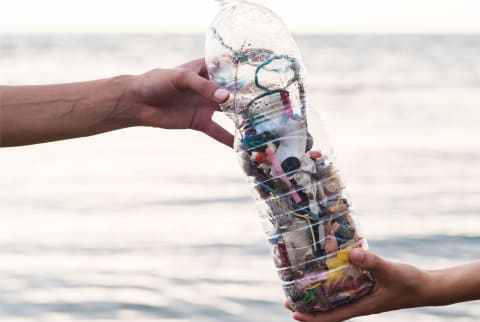7 Fun Ways To Cultivate A Sustainable Community This Year


We can't solve the climate crisis alone, and the most effective environmental action happens in community. This is something that low-waste advocate Tara McKenna knows all too well. In this excerpt from her new book, Don't Be Trashy: A Practical Guide To Living With Less Waste and More Joy, McKenna shares ideas on how to join a sustainable coalition in your community this year—and have some fun in the process:
Advertisement
Volunteer.
Volunteering can be an important part of a low-waste lifestyle because it gives you the opportunity to contribute directly and see the fruits of your labor. It's also a great way to meet new people. You can volunteer with your local municipality, at nonprofit organizations, or with school clubs, among other things.
Volunteering can be a one-time thing, like going to a beach cleanup, helping out at repair cafés, or representing an organization at an event and sharing your knowledge. Volunteering can also be a regularly scheduled commitment, like a monthly committee meeting; regular administrative work at your local tool library, helping people find and sign out items; or helping weekly with a nearby community garden.
Join a club.
Join any local clubs at school or in your community that are focused on sustainability. It'll give you a chance to work on cool projects, meet new people, learn a few new things, and expand your sense of community in a productive and helpful way.
Advertisement
Create a green team at work or at school.
It doesn't matter how many people you have in your workplace; you can let everyone know you're starting a green team to expand everyone's knowledge and have a positive impact in the office and on the local community. Just be sure to get the go-ahead, if you need to, from a supervisor first. Then you can send out an email and/or share the news through online platforms and invite people to join. Your green initiative can be formal (with meetings, minute taking, and regularly scheduled events) or informal (casual get-togethers and occasional events).
Most important, have fun! While I was really proud of the action my office's team took, my favorite part was eating pizza after a big green team litter cleanup. Is that so wrong?
Shop local.
Switching from the big grocery store chains to the small independent businesses where you live is not only a great way to support your local economy but also a wonderful means of improving your sense of community. When you shop locally at independent businesses and places like farmers' markets, it's easier to see the same faces on a regular basis and get to know people in your town. It's refreshing and helps weave a sense of belonging, plus it'll give you the opportunity to learn more about what's going on in your community (like sustainability events).
Shopping local also helps us reduce waste because independent stores tend to be more flexible in responding to new trends, like offering refill programs and being supportive of reusable containers and bags. Big-box stores might have more red tape in terms of updating policies to support low-waste shopping.
Advertisement
Participate in events.
Attending events is entertaining, but you can often volunteer to help make public events in your community less trashy and more sustainable. Use your passion and interest to come up with ideas for reducing the waste footprint of events like festivals, concerts, outdoor movie nights, art exhibitions, pop‑up markets, religious gatherings, and more.
Attend climate strikes and sustainability marches.
Sometimes strikes and marches feel a bit out of my comfort zone (I show up anyway), but they're a great way to get social, spread awareness, learn more, meet new friends, and put pressure on the government for change.
Fridays for Future is a great resource for climate-related demonstrations, and while not directly a waste-related platform, the main issues are deeply interconnected because waste contributes to climate change. For example, organic material that breaks down in landfills generates methane gas, which is a greenhouse gas contributing to climate change.
Advertisement
Get civically engaged.
From voting to attending public meetings, exercise your right to participate as an active community member with your local government council. You'll meet new people who also actively participate in community decision-making, from city staff and elected officials to other engaged citizens. You can make your voice heard through official channels when you participate in this capacity. Your local government's website should be the best place to go for information on civic events, committees, and other projects you may want to have your say on. If you can't find what you're looking for, give your city hall a call.
Excerpt from DON'T BE TRASHY: A Practical Guide to Living With Less Waste and More Joy. Copyright © 2022 by Tara McKenna. Published by Rodale Books, an imprint of Penguin Random House.
Advertisement

Tara McKenna is passionate about sustainability and created The Zero Waste Collective lifestyle blog and community to inspire people from all walks of life to live with less waste and more joy. With her global online community reaching thousands of readers monthly, Tara offers simple strategies to live more sustainably. Tara has a master’s degree in Urban and Regional Planning, and now works full time as an entrepreneur. Having lived and studied abroad, she is well traveled and has seen the global environmental crisis firsthand, which is why she’s motivated to ensure a sustainable future for people and the planet! She lives with her husband and black lab in Guelph, Canada.